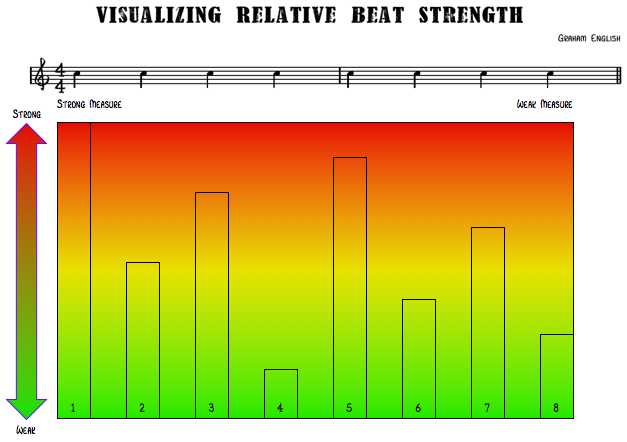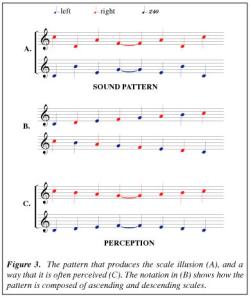I was taught to organize rhythms into increments of two measures at a time. Some beats/pulses get a natural emphasis in relation to their placement in the measure. I put together this illustration of the most natural points of relative emphasis in a … [Read more...]
Five Auditory Illusions
I've talked about the Shepard Tone before but NewScientist has just posted five great auditory illusions. The virtual barber shop is fun! You'll need headphones. I remember experiencing something like this at Disney World as a kid. Phantom … [Read more...]
The Best Of Graham English 2007
It's time for my yearly reflections and celebrations. By far the most popular and most controversial post of 2007 was The Zen Of Attraction. I'm surprised at the attention it received because I wrote it as an aside. Some people loved it and some … [Read more...]
How To Use Tension And Release In Your Melodies
Music, much like life, is fundamentally a swinging pendulum between tension and release. Fortunately, with music, this is easy to represent objectively and to utilize in your music composition. Taking a look at the C major scale, you can see that … [Read more...]
Absolute Pitch Ear Training Podcast 04-09-07
Topics covered: Singing what you hear, the body/mind connection in music, exercises to improve your musicianship, and more. Download: Absolute Pitch Ear Training Podcast 04-09-07 … [Read more...]
Confusing Music Theory Fundamentals And Cliche
Wanna hear something provocative? Check out this quote from an old issue of keyboard magazine. "On this experimental record, I've been trying to explore more jazz harmonies. The thing is -- and I'm gonna piss off a lot of people here -- the II-V-I … [Read more...]
Fantastic Music Theory Resource
Dolmetsch online has made significant contributions to the world of early music. They also host a serious online music dictionary and composers biography. I especially like their 1000+ scales and practical guide to composition. Check it out. … [Read more...]
Top Music Theory Articles for 2006
Looking back over 2006 I can say that I learned a lot. And it seems that I taught a lot too! These music theory articles should keep you busy over the holiday break. The Rules and Principles of Counterpoint Deceptive Cadences Advice To … [Read more...]
Is Your Ear Suspect?
If your ear can't understand whatever it hears, then it's suspect. Whatever the application -- composing, songwriting, singing, playing the guitar, piano, or any other instrument -- there is a logic to becoming a spontaneous musician. Your goal as a … [Read more...]
Why Singing What You Hear Is Important To Your Ear Training
Singing what you hear is an important part of improving your perception. Let's look at it from a body/mind perspective. Recognizing that C and F is a perfect fourth is a cognitive exercise. You have to think about it. Maybe only for a split-second, … [Read more...]

